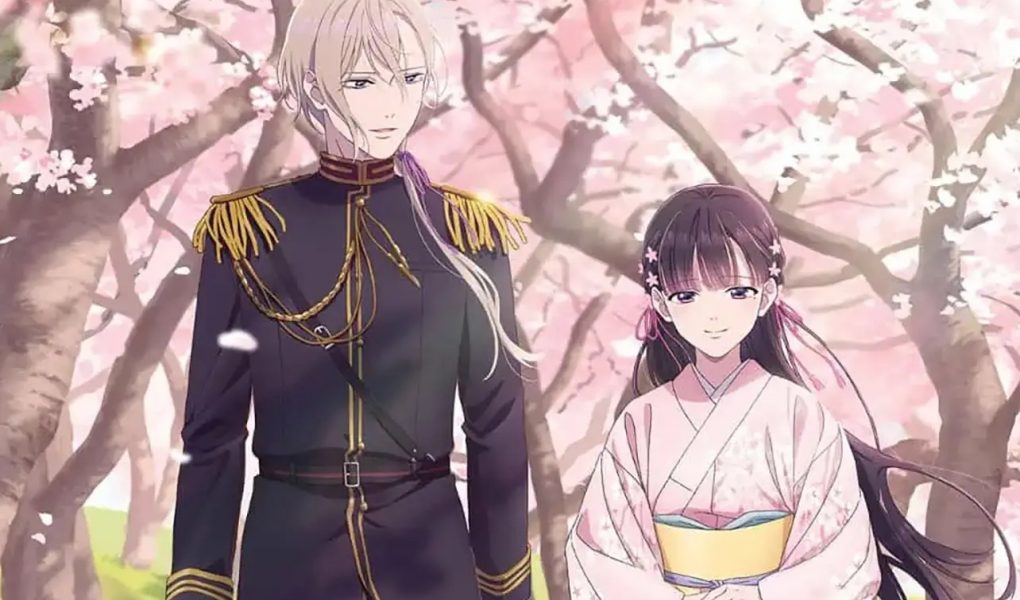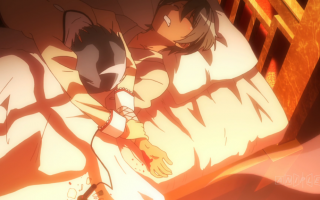
It’s a tale as old as time: a girl from an abusive family meets her prince and experiences a brief and sweet reprieve from her miserable existence. But it can’t last forever—when the clock strikes midnight, she must return to her old life. But the prince swears not to give up on her, and he searches the entire kingdom to find her again…
The My Happy Marriage anime follows the classic template of a Cinderella story within the backdrop of a fantasy Meiji/Taisho Japan. The heroine Miyo is at rock bottom when she meets her fiancé Kudo, but their interactions slowly draw her out of her shell. Hence why it’s called “My Happy Marriage” even though they spend most of the story not being married.
I really like My Happy Marriage. I wouldn’t necessarily describe myself as a sucker for Cinderella stories in general, but this one struck a chord with me because of its honest portrayal of Miyo’s negative mindset. Even when she finally experiences some kindness from other people, her self-loathing doesn’t disappear. Kudo tells her to lift her head and not be ashamed, but he cannot rid the demons that haunt her heart. The abusive stepmother and stepsister are much more than just a cheap way of garnering sympathy for the heroine.
Episode 4 is where you really start to see these strands of characterisation come to a head. Miyo is in a good mood after her date with Kudo in the previous episode, but a simple encounter with her sister on the street is enough to devastate her.

What stands out about this scene is that Kaya isn’t even at her worst here. She has said far more egregious things in her earlier appearances. All she really does is callously parrot Miyo’s negative assumptions about herself—that Kudo was always bound to ditch her, and that she hasn’t changed in the slightest. She is cruel in a way she masks as sisterly kindness (“If you need money, just ask. If you get down on your knees and beg, I’ll see what you can do”), and it’s notable that she quickly cleans up her act when an outsider appears. This is a series that really understands the dynamics of psychological abuse.
I also liked that Kudo is not the first person to show Miyo kindness. Koji, for instance, is weak-willed but makes a point of saying nice things. The servant Hana tried to stand up for Miyo in her childhood; though she was dismissed at the time, she comes back in episode 4 to demonstrate some human warmth. Kudo distinguishes himself by having the privilege and force of will to commit where others couldn’t or didn’t.
Kudo’s servant Yurie is the real MVP of the story. The unassuming kindness and enthusiasm she displays at her first meeting with Miyo feels like a genuine shock at that point in the story. Veteran voice actress Houko Kuwashima absolutely nails the voice of a senior citizen who still possesses an abundantly youthful heart—you can just sense what an adorable girl she was when she was younger.

It is Yurie who sticks up for Miyo when Kudo is cold and arrogant. Kudo’s ice king act only lasts for an episode, but Yurie serves as the important bridge between the awkward couple. The second episode makes it clear that though this is a love story, it is not merely a tale of a man swooping in to save the heroine. It’s really about Miyo finding the strength within herself to not only cope but to find something to live for.
In this way, My Happy Marriage brings out the best in Cinderella stories. Though Cinderella finds her salvation with the prince, she is the one who makes the all-important first step to attend the ball. If she chose to ignore the Fairy Godmother, then there wouldn’t be a story. And the original tale is even sober enough to acknowledge that it’s not so easy for Cinderella to break away from her abusive family altogether.
Most of all, I feel that there is a certain reality to a character who can never quite shake their defeatist outlook. Fictional stories are full of inspiring people; even when they suffer hardships and setbacks, we can always admire a hero who quickly bounces back. Miyo is not that kind of character. She does change for the better over time, but she is prone to negative spirals. When nice things happen to her, she mentally recontextualises it in a way that makes her miserable. She does not find it easy to be happy.
It’s a good thing that this series is called My Happy Marriage, then. It’s a constant, steady promise that there is light at the end of the tunnel, that it is possible to be happy. It is the goal our characters can aspire to.
It is a truly powerful love story.




